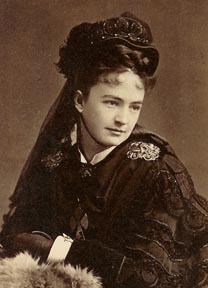
Elizabeth Bacon Custer (April 8, 1842 - April 6, 1933) was the wife of General George Armstrong Custer. After his death, she became an outspoken advocate for her husband's legacy. Custer's portrayal as a gallant fallen hero and the glory of Custer's Last Stand that were canons of American history for more than a century after his death was largely the result of her endless campaigning on his behalf.
Elizabeth "Libbie" Bacon was born in Monroe, Michigan in 1842, the daughter of a wealthy and influential judge. As the only one of the judge's children that would live to adulthood, her father doted on her. Elizabeth was both beautiful and intelligent, and her father hoped she would make a good marriage with a man from her own elevated social class.
She met her future husband in 1862 in the midst of the American Civil War. She fell deeply in love with him but her father refused to allow them to get married. Custer was from a poor undistinguished family and the Judge hoped Libby would have better than the life of an army wife. After Custer was promoted to Brevet Brigadier General, Judge Bacon finally relented and they were married on February 9, 1864.
Libbie and George had a loving but tumultuous relationship. Both were stubborn, opinionated, and ambitious. Their private correspondences were filled with sexually charged double entendres. Despite hardships, they were utterly devoted to each other. She followed him to every assignment, even during the latter days of the Civil War. The depth of their relationship has been the subject of considerable interest in books and film.
After the war, he reverted from his rank of general and was assigned to a series of dreary and unsatisfying assignments in Texas, Kansas, and the Dakota Territory. Life on the frontier outposts was difficult and Custer's career was plagued by problems including a court martial (brought about by his leaving the field to be with Libbie).
The 1876 campaign against the Sioux seemed like a chance for glory to Custer. From Fort Abraham Lincoln in what is now North Dakota, He led the Seventh Cavalry in pursuit of Sitting Bull, Crazy Horse and the Sioux and Northern Cheyenne who refused to be confined to the reservation system.
After her husband's column was wiped out at the Battle of the Little Big Horn in June 1876, many in the press, Army, and government criticized Custer for blundering into a massacre. President Ulysses S. Grant publicly blamed Custer for the disaster. Fearing that her husband was to be made a scapegoat by history, Libbie launched a one woman campaign to rehabilitate her husband's image. She began writing articles and making speaking engagements praising the glory of her martyred husband. Her three books, Boots and Saddles, (1885), Following the Guidon (1890); and Tenting on the Plains, (1893) were brilliant pieces of propaganda aimed at glorifying her dead husband's memory. Though generally considered to be largely factually accurate, they were clearly slanted in Custer's favor.
Her efforts were largely successful. The image of a steely Custer leading his men against overwhelming odds only to be wiped out while defending their position to the last man became as much a part of American lore as the Alamo. It would not be until the late 20th century, more than a half century after her death, that many historians began to take a second look at Custer's actions leading up to the battle and found much to criticize.
Libbie remained utterly devoted to her husband and never remarried. She died in New York City a few days before her 91st birthday. She was buried next to her husband at West Point.
Libbie was portrayed by actress Olivia de Havilland in the 1941 film They Died with their Boots On, by Mary Ure in the 1967 film Custer of the West, by Blythe Danner in the 1977 television movie The Court Martial of George Armstrong Custer, and by Rosanna Arquette in the 1991 television mini-series Son of the Morning Star.

0 件のコメント:
コメントを投稿